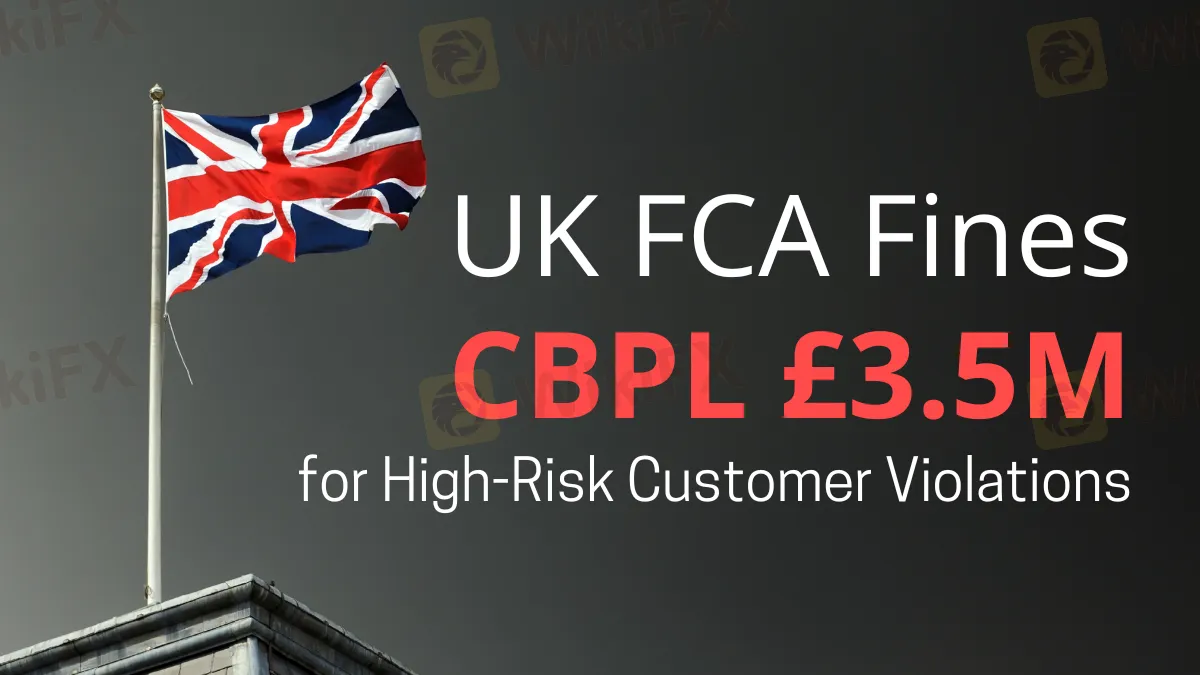简体中文
繁體中文
English
Pусский
日本語
ภาษาไทย
Tiếng Việt
Bahasa Indonesia
Español
हिन्दी
Filippiiniläinen
Français
Deutsch
Português
Türkçe
한국어
العربية
UK FCA Fines CBPL £3.5M for High-Risk Customer Violations
Abstract:The UK FCA has fined CBPL £3.5M for onboarding high-risk customers, violating regulatory requirements, and weak financial crime controls.

The Financial Conduct Authority (FCA) fined CB Payments Limited (CBPL), a member of the Coinbase Group, £3,503,546 for failing to comply with regulatory standards. The good outcomes of CBPL's inability to follow guidelines prevented it from providing services to high-risk clients.
CBPL provides a worldwide crypto asset trading platform but does not directly handle crypto-asset transactions. Instead, it allows customers to access these transactions via other Coinbase Group firms. CBPL needs to be registered in the United Kingdom to conduct crypto-asset transactions.
CBPL Exceeds High-Risk Levels
Following negotiations with the FCA, CBPL agreed on a voluntary requirement (VREQ) in October 2020. This criterion was motivated by worries regarding the efficiency of CBPL's financial crime control structure. The VREQ expressly forbade CBPL from onboarding new high-risk clients until its control mechanisms could be improved.
Despite this prohibition, CBPL accepted and served 13,416 high-risk clients with e-money services. Approximately 31 per cent of these consumers made deposits totalling USD 24.9 million. These monies were then utilized for withdrawals and crypto asset transactions via other Coinbase Group firms, totalling about USD 226 million.

CBPL violated the VREQ by failing to develop, test, implement, or monitor appropriate controls, resulting in the first FCA fine under regulations. The company should have considered all possible onboarding techniques and effectively monitored compliance. As a result, several severe breaches went unnoticed for almost two years.
Therese Chambers, the FCA's Joint Executive Director of Enforcement and Market Oversight, underscored the seriousness of the situation: The money laundering concerns linked with cryptocurrency are evident, and enterprises must take them seriously. Firms that support crypto trading, such as CBPL, must have rigorous financial crime controls.
Chambers said, “CBPL's controls had major flaws, which is why the restrictions were enforced. CBPL, on the other hand, consistently violated these rules. This enhanced the likelihood that criminals would utilize CBPL to launder their money. We will not allow such leniency, which endangers the integrity of our markets.”
Conclusion
This is the FCA's first enforcement action under the 2011 Electronic Money Regulations. CBPL agreed to remedy the situation, which resulted in a 30% reduction in the punishment. The FCA's decisive action emphasizes the significance of financial solid crime controls in the fast-changing crypto asset business.
For trending news, access the daily news on the financial market here.

Disclaimer:
The views in this article only represent the author's personal views, and do not constitute investment advice on this platform. This platform does not guarantee the accuracy, completeness and timeliness of the information in the article, and will not be liable for any loss caused by the use of or reliance on the information in the article.
Read more

WikiFX Review: Is IQ Option trustworthy?
IQ Option is catching our eye as it seems to be a trending topic. For those who want to know whether IQ Option is a reliable broker, WikiFX made this article to help you better understand this broker.

Pros and Cons of Choosing Unregulated Forex Brokers
Discover the pros and cons of unregulated forex brokers, explore risks, benefits, and key features, and learn how to evaluate their credibility with the WikiFX app.

5 Questions to Ask Yourself Before Taking a Trade
Before executing any trade, traders should pause and ask themselves critical questions to ensure they are making rational and well-informed decisions. Here are five questions to help you reflect on your strategy, manage risk, and control emotions before entering the market.

Gigamax Scam: Tracking Key Suspects in RM7 Million Crypto Fraud
Malaysian authorities are actively pursuing seven individuals linked to the Gigamax investment scam, which has defrauded investors of over RM7 million. The suspects include an Indonesian national, identified as Awaludin, who is believed to be the mastermind behind the scheme, and six Malaysians who served as promoters and speakers for the fraudulent operation.
WikiFX Broker
Latest News
HTFX Clone Firm Exposed
Spotware Unveils cTrader Store, Global Marketplace for Algo Creators
Elderly Trader Loses RM2.1M in WhatsApp Forex Scam
Gigamax Scam: Tracking Key Suspects in RM7 Million Crypto Fraud
TradeExpert: A Forex Broker Under Scrutiny
Singaporean Arrested in Thailand for 22.4 Million Baht Crypto Scam
Trader Turns $27 Into $52M With PEPE Coin, Breaking Records
ASIC Sues HSBC Australia Over $23M Scam Failures
WikiFX Review: Is IQ Option trustworthy?
IOTA Leads Blockchain Innovation in Southeast Asia by 2025
Currency Calculator


